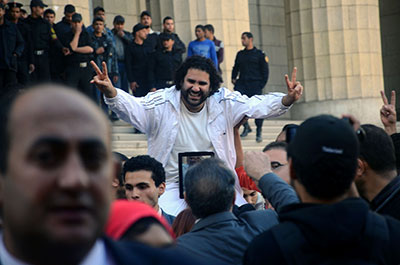The government of Egyptian President Mohamed Morsi continues to escalate its offensive against journalists. Details of the most recent case, in which an arrest warrant was issued for blogger Alaa Abdelfattah for inciting “aggression” against members of the Muslim Brotherhood, show how low the government is willing to go in order to silence its critics.
Abdelfattah went voluntarily Tuesday to the office of Prosecutor General Talaat Abdullah after hearing about the warrant against him in the media. What followed was a mockery. According to his testimony, the questions he received were all about comments by others posted on his Twitter and Facebook accounts, not about things he said or did. There was no evidence, witnesses, or even a sign of prior investigation by police. Their focus was on a Twitter mention of his user name by another Twitterer, going by the handle Princess Joumana. The naïve members of the Muslim Brotherhood who filed the complaint against Abdelfattah apparently thought the interaction on social media was a conspiracy involving a real princess–possibly from a hostile government such as that of the United Arab Emirates, where Brotherhood members are being put on trial.
Furthermore, according to Abdelfattah, there was never a need to issue an arrest warrant, since he was never asked, and never declined, to appear in front of the authorities for investigation. Even more astonishing, the arrest order came only three days after the complaints were presented to the Prosecutor General, while many other complaints and requests for investigation–including into attacks by members of the Muslim Brotherhood–have not been carried out. Why the rush to investigate a Twitter mention while turning a blind eye to assaults and other human rights violations by Muslim Brothers and Egyptian police which have been documented and shown on TV?
The answer is clear. When your adversary is also the judge, a Twitter mention can become evidence. In his testimony, Abdelfattah said he denounced the investigation and sought an independent judge to run it instead of the prosecutor general. The latter, in Abdelfattah’s view, is allied with the Muslim Brotherhood, who initiated the complaint against him. Abdullah was appointed by Morsi in November in a power grab that resulted in a series of protests by the opposition and strikes within the judiciary. Today, in fact, Egypt’s Court of Appeals ruled that Morsi’s sacking of Abdullah’s predecessor was illegal and void, according to news reports, and the Egyptian Syndicate for Journalists announced that it would not cooperate with him.
Abdelfattah is a well-known blogger who also refused to cooperate with a military court investigation against him last year for criticism of the ruling Supreme Council of the Armed Forces (SCAF), which released him. On Tuesday, hundreds of his friends, supporters, and volunteer lawyers accompanied him to the prosecutor general’s office. The show of support forced prosecutors, once again, to release him without bail–but what happens to others in the Egyptian media who do not have his profile and support?
There are reports that the investigation against Abdelfattah is one of dozens, and that other journalists critical of the Muslim Brotherhood will be next. Today, government newspaper Al-Ahram reported that Lamees al-Hadidy, Amro Adeeb, and Youssef al-Husseiny, who host three of the top talk shows on CBC, OnTV, and Orbit private TV channels, respectively, will be investigated for “violating journalist’s ethics in order to incite sedition and chaos and threatening national peace.” Those in media are already coming under pressure from inflammatory, anti-press comments by Morsi and members of the Brotherhood, and now they can witness how the law is being abused and the justice system bent backwards in order to silence them.
As troubling as this is, it’s perhaps more troubling that young activists who use social media to disseminate information and news about the Muslim Brotherhood are taking a direct hit. The government, in order to continue investigations and produce evidence, has decided to launch an Internet monitoring operation by those police who usually patrol the Internet for fraud and other online crimes. There is a fear that this will be used to track activist down and violate their privacy. Today, local news reported that Essam Mohamed, a Facebook activist who runs an anti-Muslim Brotherhood page under a fake name, was arrested without charge in the industrial city of Mahalaa on a complaint to the public prosecutor that he, like Abdelfattah, incited “aggression” against members of the Brotherhood.
Editor’s Note: The text has been updated to reflect the correct spelling of Alaa Abdelfattah’s name.
